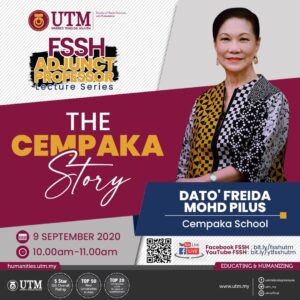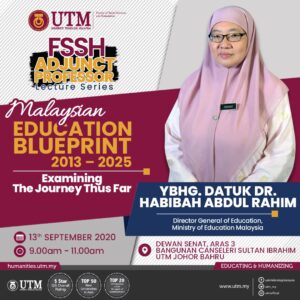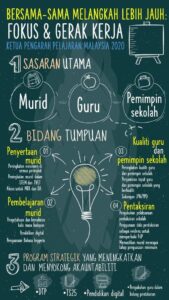Category: FSSH Adjunct Professor Lecture Series
FSSH Adjunct Professor Lecture Series: Prof Dr Keith Taber
FSSH Adjunct Professor Lecture Series: Dato’ Freida Mohd Pilus
I could not attend the FB live session as I had to attend a briefing by Yayasan Inovasi Malaysia (YIN). So, I watched the recorded video on Youtube. What could I say other than “Wow”. She is the epitome of resilience, elegance and intelligence. From a mother’s wish to give the best education to her five children, she embarked on a journey to establish a private school in 1983 which might be considered as a brave endeavor.
She is 73 years old this year and does not look like one. Her passion on teaching is displayed throughout the session. With twinkling in her eyes, she answered questions posed by audiences without missing a beat and kept herself poise as always.
I don’t know if I can be like her. To have such strong determination and perseverance to achieve her dreams without losing hopes. But I notice that she emphasizes several key points through examples. Among the key points that are being emphasized are: working hard, be passionate about what you do, believe in your dreams and not losing hopes easily when things are the hardest. Something that I could not miss.
I would try to emulate her and hope one day I could pass her wisdom to others.
FSSH Adjunct Professor Lecture Series: YBhg. Datuk Dr Habibah Abdul Rahim
Malaysia Education Blueprint 2013-2025:….. Examining the journey thus far
Key points:
- Challenges due to unforeseen event i.e. COVID-19 pandemic prompt teachers, parents and students to adjust to the new norms. It is not easy to ensure the practice of physical distance yet learning has to happen no matter what. It prompts all respective parties to use digital learning to the max.
- The priorities of education would always have to be translated into action regardless of whatever event that could derail the progress of learning at institutions level (schools and higher education institutions).
- Malaysia Education Blueprint set the stage of where our education is heading forward but we have to understand the current performance and challenges of education system, establish a vision and aspirations for the system and students and outline the transformation program for the system.
- Outlining the current blueprint is not about just preparing the document but how we would deliver the vision and aspirations (policies) at various levels through dedicated teams.
- There are 11 key shifts to achieve aspiration (refer to the first 4 chapters in the blueprint): access, quality, equity, unity, efficiency, empower, ICT, transform (accountability), partnership, budget, transparency
- Rigorous monitoring process: with KPIs, charters and budgeting to ensure continuous supports are delivered and accountability to be assured.
- 2-12% of students are not in schools for various reasons and yet, there are various attempts, efforts and programmes have been and are being delivered.
- Access to technical and vocational education is one of the main agenda = to enhance technical skills among students
- Address the issue of transitioning and dropping out especially among the most disadvantaged i.e. students from Orang Asli community (the rate of completion is still low)
- New assessment i.e. UPSR and such somehow poses another challenge to improve and bridge the gap of dropping out and school completion among students especially the disadvantaged.
- Participation in STEM subjects especially in pure sciences subjects has been steadily declined over the years especially as students pursue their education at higher level i.e. post secondary education. 1/5 of students who originally from pure science stream would going to further their study in pure sciences field at post secondary education.
- The quality of education system would not exceed the quality of teachers. The quality of education depends on the quality of teachers. Thus, it is important to ensure we provide the best training teacher education to pre-service teachers. 450k teachers (young teachers) are currently work as teachers in Malaysia and to enhance proficiency in English based on the alignment of CEFR. For the time being, it is only meant for English teachers.
- Digital competency among students (primary and secondary) is skewed in which those who go to schools equip with good ICT facilities would have better digital competency.
- The ecosystem within the school is related to students’ competency on digital skills.
- Zero Reject Policy is in motion with various programmes such as programmes for special needs students, programmes for children of migrants or asylum seekers, ziarah cakna and such.
- The emphasis on the results is still prevalent in Malaysia. We often ask “How many As do you get?” rather on the question “What have you learned over the 11 years of schooling?”
- The societal value (in Malaysia) makes it a challenge to change the current practice in which teachers still practice “teaching to the test” i.e. teachers teach what would be “appeared” in the examination.
- School completion requires students to have minimum expected skills and knowledge as set by the Ministry of Education (education system) to ensure our future generations would be future proof to face 4IR challenges.
- Selection of those undergoing teaching training programmes has been improved and also, there are continuous programmes given to current teachers to enhance their teaching practice.
- School leadership is the 2nd biggest factor influencing students’ learning after teachers’ instructional delivery. Thus, it is important to emphasise on the preparation of instructional planning and delivery than administrative aspects.
- COVID-19 has given impacts on society at various levels especially the most affected are the vulnerable (the disadvantaged).
- DELIMa (Digital Educational Learning Initiative Malaysia) is a culmination of efforts from the ministry along with Google, Microsoft and Apple. Yet, it is all go back to the issues of teachers and students’ preparedness in online learning, digital divide and connectivity as well as providing support to the most vulnerable including students with disability.
- The accuracy of information and speed of information delivers from various parties to different levels of parties.





